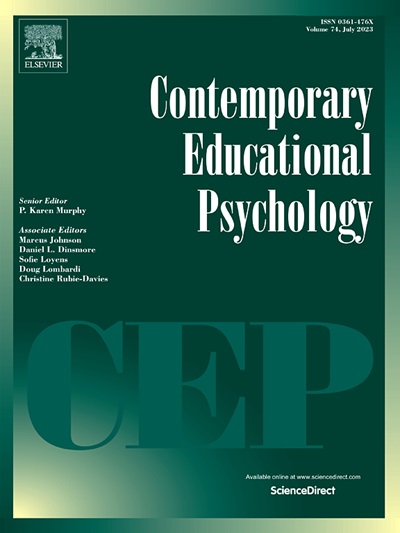Investigating Adolescents’ Execution Speed of Social, Dimensional, and Temporal Comparisons
IF 3.8
1区 心理学
Q1 PSYCHOLOGY, EDUCATIONAL
引用次数: 0
Abstract
Social, dimensional, and temporal comparisons influence students’ academic self-concepts to different degrees. Typically, social comparison effects are stronger than dimensional comparison effects, which in turn are stronger than temporal comparison effects. A possible explanation for these different comparison effects could be differences in the cognitive processes involved in social, dimensional, and temporal comparisons. To gain insight into this issue, the present study addresses the execution speed of social, dimensional, and temporal comparisons using a response time experiment, in which N = 209 students (9th and 10th grade) were asked to evaluate their achievements in various subjects in relation to social, dimensional, and temporal comparison standards. Response times to social, dimensional, and temporal comparisons were compared using a repeated measures ANOVA and were found to be shortest for temporal comparisons and longest for social comparisons. Moreover, they were shorter when comparisons used non-specific comparison standards (i.e., multiple people/subjects/points in time) compared to specific comparison standards (i.e., single person/subject/point in time). Accordingly, temporal comparisons appear to facilitate the fastest execution speed, followed by dimensional comparisons, and then social comparisons. Furthermore, non-specific comparisons appear to facilitate a faster execution speed than specific comparisons.
调查青少年社会、维度和时间比较的执行速度
社会比较、维度比较和时间比较对学生学业自我概念有不同程度的影响。通常,社会比较效应强于维度比较效应,而维度比较效应又强于时间比较效应。对于这些不同的比较效应,一个可能的解释可能是涉及社会、维度和时间比较的认知过程的差异。为了深入了解这一问题,本研究采用反应时间实验来研究社会、维度和时间比较的执行速度,在该实验中,N = 209名学生(9年级和10年级)被要求评估他们在不同科目中与社会、维度和时间比较标准相关的成就。使用重复测量方差分析比较社会、维度和时间比较的反应时间,发现时间比较的反应时间最短,社会比较的反应时间最长。此外,使用非特定比较标准(即多人/受试者/时间点)的比较比使用特定比较标准(即单个人/受试者/时间点)的比较要短。因此,时间比较似乎促进了最快的执行速度,其次是维度比较,然后是社会比较。此外,非特定比较似乎比特定比较有助于更快的执行速度。
本文章由计算机程序翻译,如有差异,请以英文原文为准。
求助全文
约1分钟内获得全文
求助全文
来源期刊

Contemporary Educational Psychology
PSYCHOLOGY, EDUCATIONAL-
CiteScore
16.50
自引率
3.90%
发文量
74
期刊介绍:
Contemporary Educational Psychology is a scholarly journal that publishes empirical research from various parts of the world. The research aims to substantially advance, extend, or re-envision the ongoing discourse in educational psychology research and practice. To be considered for publication, manuscripts must be well-grounded in a comprehensive theoretical and empirical framework. This framework should raise critical and timely questions that educational psychology currently faces. Additionally, the questions asked should be closely related to the chosen methodological approach, and the authors should provide actionable implications for education research and practice. The journal seeks to publish manuscripts that offer cutting-edge theoretical and methodological perspectives on critical and timely education questions.
The journal is abstracted and indexed in various databases, including Contents Pages in Education, Australian Educational Index, Current Contents, EBSCOhost, Education Index, ERA, PsycINFO, Sociology of Education Abstracts, PubMed/Medline, BIOSIS Previews, and others.
 求助内容:
求助内容: 应助结果提醒方式:
应助结果提醒方式:


